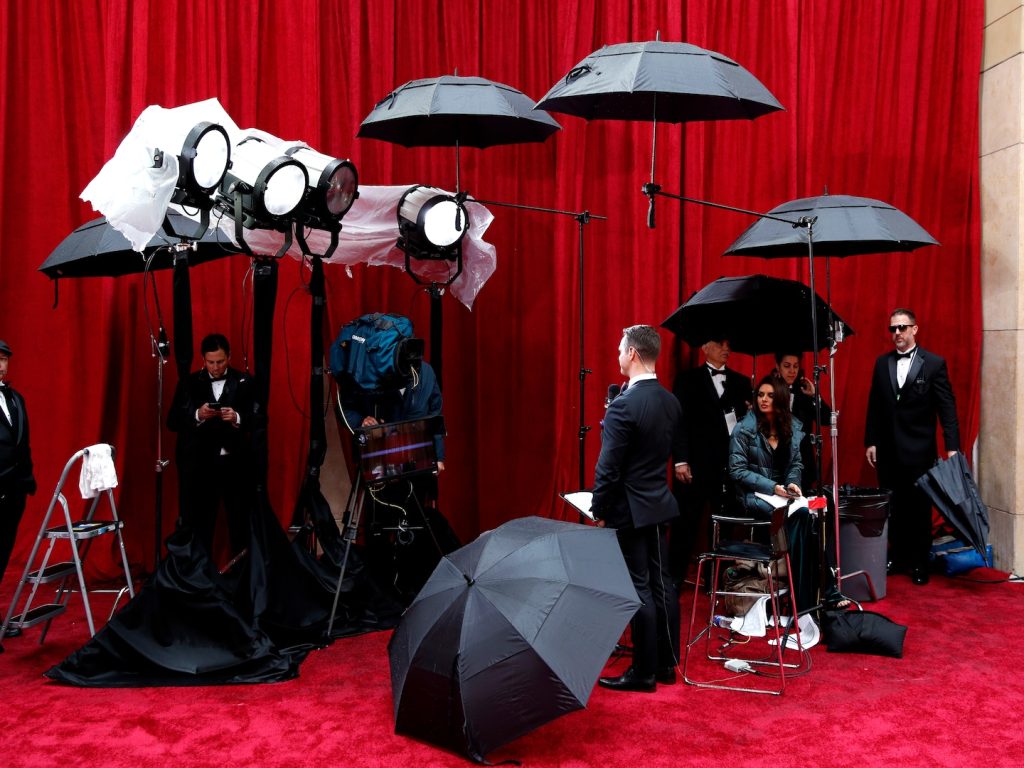The strike has done more than keep actors from acting. The union’s rules also prohibited them from doing any labor on behalf of the studios during the strike — such as promoting their new movies and TV shows.
That has effectively shut down many of the rituals of Hollywood — the fancy red carpet premieres and press junkets. It has forced entertainment journalists to get more creative in how to fill up their days and story quotas.
Which explains why you’ve seen more interviews with nonactors — musicians, directors, set designers — as well as actors hawking their personal brand of tequila or sunscreen, or perhaps their new books.
That’s right: You can still promote your book.
Lesser-known entertainers, like mid-tier stand-up comedians, have also gotten more attention. “Some people got their shot maybe a little earlier than they would have otherwise,” as one producer for a popular interview radio show put it.
Freelance entertainment journalist Emily Zemler recently interviewed the production designer from “Barbie,” who relayed that crew members were definitely “getting more time in the spotlight,” since the A-list cast was off limits.
“When you’re in a big or small film, you want to be able to talk about it, especially if it’s a meaningful performance or something you’ve spent years of your life pursuing,” Zemler said. Bradley Cooper, for example, has a forthcoming Leonard Bernstein biopic, “Maestro,” on behalf of which interviews with an array of media outlets would allow him to reach a broad general audience. “He’s going to want to describe the inspiration behind it,” she said.
The big studios and striking actors will head back to the negotiating table on Monday, with both sides formally talking for the first time in months. The actors went on strike in July, and those observing the picket line had to avoid any promotional activities for television and film projects covered by union contracts — including interviews, fan expos, podcast appearances and even social media posts.
For many entertainment journalists, adjusting to the strike was reminiscent of the early months of the pandemic, which put television and film projects on pause and shuttered in-person events.
But this time, interviewers have had to navigate a complex web of rules, in part because they want audiences to know they aren’t crossing picket lines — and neither are their subjects. Celebrity-interview podcasts like “Podcrushed” made it clear that certain chats were recorded before the SAG-AFTRA strike. So have countless print outlets, from the Hollywood Reporter when interviewing the stars of the streaming show “Minx” to Ebony quoting John David Washington about his new movie, “The Creator.” Conan O’Brien made a point of telling listeners of his popular podcast that he was allowed to ask Cedric the Entertainer about his new novel.
Some celebrities have faced blowback for perceived rules violations. Selena Gomez caused an uproar when a post about her Hulu show “Only Murders in the Building” briefly appeared on her Instagram page. It was soon deleted.
Journalist Valentina Valentini found a way to interview “Schitt’s Creek” actor Noah Reid — by strictly asking him about his burgeoning sideline as a singer-songwriter.
Still, this period has been especially challenging for freelancers such as herself. About 75 percent of the stories she typically writes are based on interviews with actors, directors and writers — in that order. “Even on a good day freelance entertainment journalism is a tricky thing to navigate,” she said. Now, she’s had to get even more creative with her pitches. “My income has definitely gone down, and I really hope for everybody’s sake the resolution comes quickly.”
Many other echelons of Hollywood workers, from craft services workers to set designers, that support the unions’ causes have nonetheless felt the economic ripple effect, which Gov. Gavin Newsom (D-Calif.) estimated at billions of dollars across the state. No more fan-expo appearances means no more car services shuttling celebrities around. No more red carpets mean no more work for hair and makeup artists.
Despite appearances, red carpets are far from glamorous assignments. “It’s hot or cold, you’re standing for hours, it’s not your party and nobody cares what you’re wearing or that you are there, period,” said longtime entertainment reporter Carita Rizzo. “You’re going up to strangers and within 45 seconds, you’re like, ‘Hey, can we talk about your divorce?’”
But it is also a fun challenge, and she’s hopeful they’ll return before awards season — which was supposed to have already started — kicks into high gear with Oscar campaigning.
“It’s very instinctual, it’s an adrenaline rush,” she said. “You have to think fast. Basically, all the knowledge you have accumulated during your entire career has to come into play at a moment’s notice.”
For some, it was a bit of a welcome relief to have a break from press junkets. These are a sort of cattle-call for actors and journalists alike, with reporters ushered into a hotel room and given about 15 minutes to elicit a new quote from a celebrity promoting a film or TV show — and actors laboring to put on a charming face and present enthusiasm and spontaneity for a sound bite they may have already repeated to 10 different journalists that day.
“I’ve often wondered whether the actors are super excited that they don’t actually have to do press junkets,” Valentini said. “But hey, maybe the break will have been nice, and we’ll feel slightly rejuvenated going back.”
